小学英语时态复习完整版
- 格式:docx
- 大小:72.04 KB
- 文档页数:4
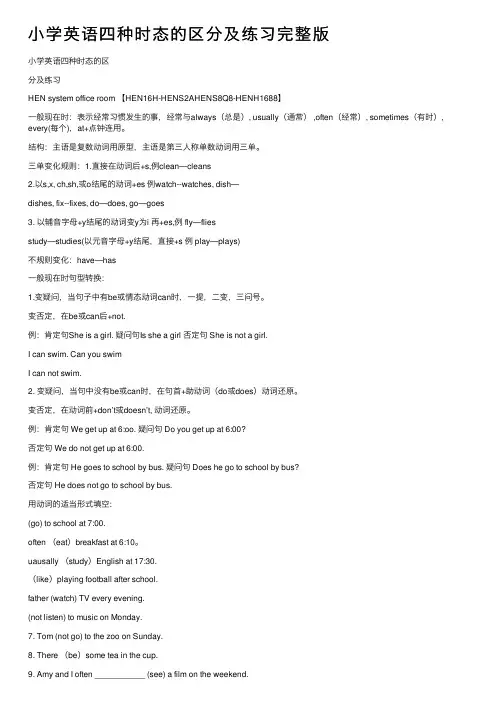
⼩学英语四种时态的区分及练习完整版⼩学英语四种时态的区分及练习HEN system office room 【HEN16H-HENS2AHENS8Q8-HENH1688】⼀般现在时:表⽰经常习惯发⽣的事,经常与always(总是), usually(通常) ,often(经常), sometimes(有时), every(每个),at+点钟连⽤。
结构:主语是复数动词⽤原型,主语是第三⼈称单数动词⽤三单。
三单变化规则:1.直接在动词后+s,例clean—cleans2.以s,x, ch,sh,或o结尾的动词+es 例watch--watches, dish—dishes, fix--fixes, do—does, go—goes3. 以辅⾳字母+y结尾的动词变y为i 再+es,例 fly—fliesstudy—studies(以元⾳字母+y结尾,直接+s 例 play—plays)不规则变化:have—has⼀般现在时句型转换:1.变疑问,当句⼦中有be或情态动词can时,⼀提,⼆变,三问号。
变否定,在be或can后+not.例:肯定句She is a girl. 疑问句Is she a girl 否定句 She is not a girl.I can swim. Can you swimI can not swim.2. 变疑问,当句中没有be或can时,在句⾸+助动词(do或does)动词还原。
变否定,在动词前+don’t或doesn’t, 动词还原。
例:肯定句 We get up at 6:oo. 疑问句 Do you get up at 6:00?否定句 We do not get up at 6:00.例:肯定句 He goes to school by bus. 疑问句 Does he go to school by bus?否定句 He does not go to school by bus.⽤动词的适当形式填空:(go) to school at 7:00.often (eat)breakfast at 6:10。
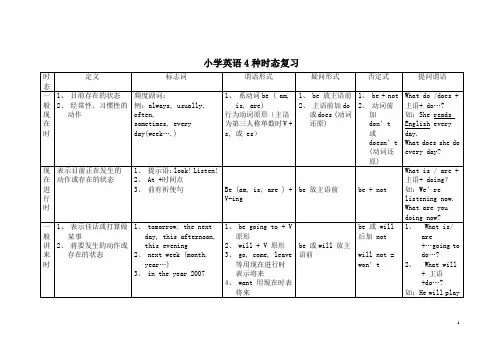
小学英语4种时态复习时态定义标志词谓语形式疑问形式否定式提问谓语一般现在时1、目前存在的状态2、经常性、习惯性的动作频度副词:例:always, usually,often,sometimes, everyday(week….)1、系动词be ( am,is, are)行为动词原形(主语为第三人称单数时V +s, 或 es)1、be 放主语前2、主语前加do或does (动词还原)1、be + not2、动词前加don’t或doesn’t(动词还原)What do /does +主语+ do…?如:She readsEnglish everyday.What does she doevery day?现在进行时表示目前正在发生的动作或存在的状态1、提示语:look! Listen!2、At +时间点3、前有祈使句Be (am, is, are ) +V-ingbe 放主语前be + notWhat is / are +主语+ doing?如:We’relistening now.What are youdoing now?一般讲来时1、表示佳话或打算做某事2、将要发生的动作或存在的状态1、tomorrow, the nextday, this afternoon,this evening2、next week (month,year…)3、in the year 20071、be going to + V原形2、will + V 原形3、go, come, leave等用现在进行时表示将来4、want 用现在时表将来be 或will 放主语前be 或 will后加 notwill not =won’t1、What is/are+…going todo…?2、What will+ 主语+do…?如:He will playbasketball next week.What will he do next week?一般过去时表示过去时间内发生的动作或存在的状态1、yesterday, lastweek/ year/ month 等2、two years ago/ in2005 / at that time 等1、动词be 的过去时(was, were)2、行为动词的过去式1、was / were放主语前2、主语前加did (动词还原)1、was/were +not2、动词前加didn’t(动词还原)What did + 主语+do…?如:Tom did hishomework lastnight.What did Tom dolast night?通过以上表格,我们明白了4种英语时态之间的关系和用法。
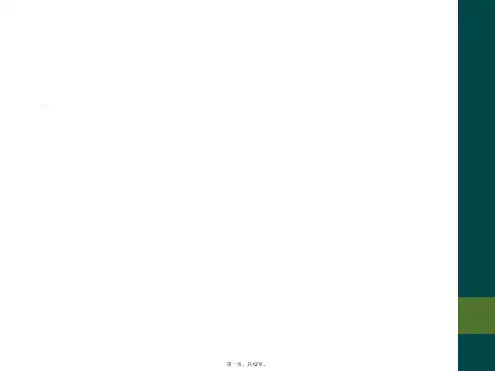
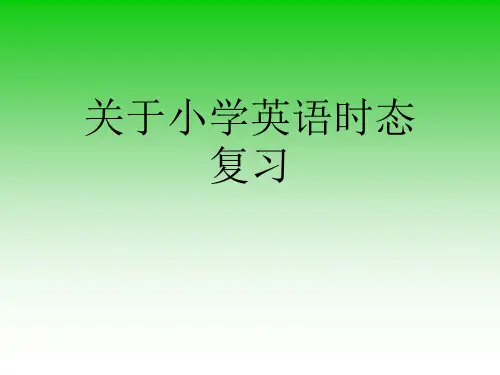
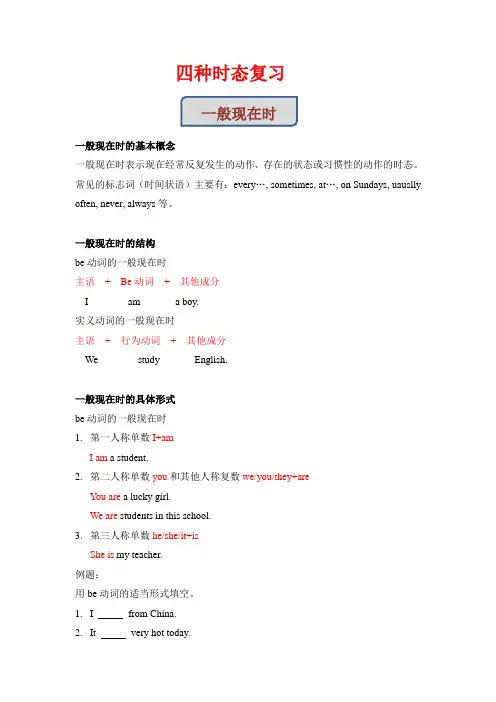
四种时态复习 一般现在时的基本概念 一般现在时表示现在经常反复发生的动作、存在的状态或习惯性的动作的时态。常见的标志词(时间状语)主要有:every…, sometimes, at…, on Sundays, uauslly often, never, always等。
一般现在时的结构 be动词的一般现在时 主语 + Be动词 + 其他成分 I am a boy. 实义动词的一般现在时 主语 + 行为动词 + 其他成分 We study English.
一般现在时的具体形式 be动词的一般现在时 1. 第一人称单数I+am I am a student. 2. 第二人称单数you和其他人称复数we/you/they+are You are a lucky girl. We are students in this school. 3. 第三人称单数he/she/it+is She is my teacher. 例题: 用be动词的适当形式填空。 1. I from China. 2. It very hot today.
一般现在时 3. They in the hospital. 4. We good students. 5. She a beautiful girl.
实义动词的一般现在时 1. 第一、二人称单数I/you和其他人称复数we/you/they+动词原形 I get up at 8 o’clock. They go to school everyday. 2. 第三人称单数he/she/it+实义动词第三人称单数形式 It runs fast. He studies hard. 例题: 用说给单词的适当形式填空。 1. We home every day.(go) 2. Trees green in spring.(turn) 3. He very hard.(study) 4. The boy up at seven O'clock.(get) 5. The earth round the sun.(move)
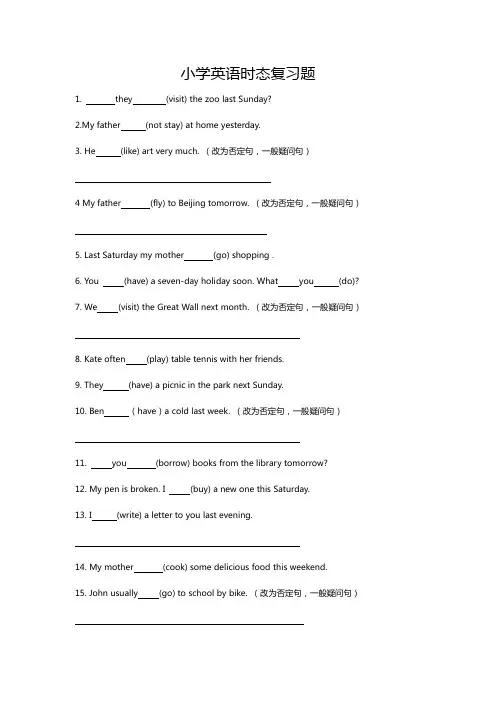
小学英语时态复习题1. they (visit) the zoo last Sunday?2.My father (not stay) at home yesterday.3. He (like) art very much. (改为否定句,一般疑问句)4 My father (fly) to Beijing tomorrow. (改为否定句,一般疑问句)5. Last Saturday my mother (go) shopping .6. You (have) a seven-day holiday soon. What you (do)?7. We (visit) the Great Wall next month. (改为否定句,一般疑问句)8. Kate often (play) table tennis with her friends.9. They (have) a picnic in the park next Sunday.10. Ben (have)a cold last week. (改为否定句,一般疑问句)11. you (borrow) books from the library tomorrow?12. My pen is broken. I (buy) a new one this Saturday.13. I (write) a letter to you last evening.14. My mother (cook) some delicious food this weekend.15. John usually (go) to school by bike. (改为否定句,一般疑问句)16. Next week David (visit) the new zoo in Panyu.17. My mother often (go) shopping and (buy) some vegetables in the market.。
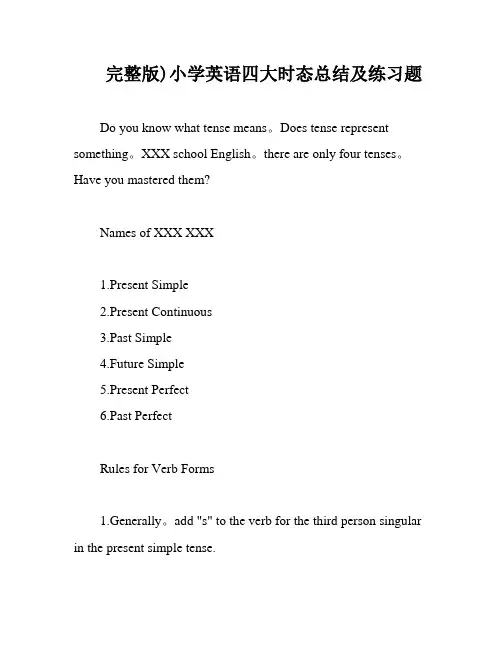
完整版)小学英语四大时态总结及练习题Do you know what tense means。
Does tense represent something。
XXX school English。
there are only four tenses。
Have you mastered them?Names of XXX XXX1.Present Simple2.Present Continuous3.Past Simple4.Future Simple5.Present Perfect6.Past PerfectRules for Verb Forms1.Generally。
add "s" to the verb for the third person singular in the present simple tense.2.For verbs ending in ch。
sh。
s。
or x。
add "es" to the verb for the third person singular in the present simple tense.3.For verbs ending in o。
add "es" to the verb for the third person singular in the present simple tense.4.For verbs XXX "y," change the "y" to "i" and add "es" to the verb for the third person singular in the present simple tense.5.For irregular verbs。
there is no specific rule.6.Generally。
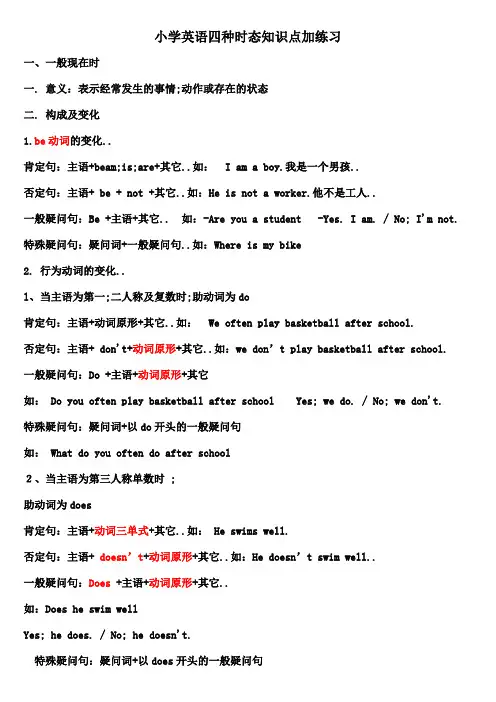
小学英语四种时态知识点加练习一、一般现在时一. 意义:表示经常发生的事情;动作或存在的状态二. 构成及变化1.be动词的变化..肯定句:主语+beam;is;are+其它..如:I am a boy.我是一个男孩..否定句:主语+ be + not +其它..如:He is not a worker.他不是工人..一般疑问句:Be +主语+其它.. 如:-Are you a student -Yes. I am. / No; I'm not. 特殊疑问句:疑问词+一般疑问句..如:Where is my bike2. 行为动词的变化..l、当主语为第一;二人称及复数时;助动词为do肯定句:主语+动词原形+其它..如:We often play basketball after school.否定句:主语+ don't+动词原形+其它..如:we don’t play basketball after school.一般疑问句:Do +主语+动词原形+其它如: Do you often play basketball after school Yes; we do. / No; we don't.特殊疑问句:疑问词+以do开头的一般疑问句如: What do you often do after school2、当主语为第三人称单数时 ;助动词为does肯定句:主语+动词三单式+其它..如: He swims well.否定句:主语+ doesn’t+动词原形+其它..如:He doesn’t swim well..一般疑问句:Does +主语+动词原形+其它..如:Does he swim wellYes; he does. / No; he doesn't.特殊疑问句:疑问词+以does开头的一般疑问句如: How does your father go to work三.第三人称单数的动词变化规则只有在第三人称为主语的肯定句中;动词才用三单式1多数动词直接加s: runs gets likes collets takes plays climbs…….2结尾是s; x; sh; ch; o;前为辅音字母; 结尾加es : watches teaches goes does washes crosses mixes brushes3动词末尾y前为辅音:将y改为i加es: study→studies fly→flies carry→carries cry→cries但在y前如果为元音则直接加s: buys says四.时间标志:always ; usually ; often ; sometimes ;every…一般现在时练习题I.用下列单词的适当形式填空1.We often___________play in the playground.2.He _________get up at si x o’clock.3.__________you _________brush your teeth every morning4.What________________do he usually________________do after school5.Danny ________________study English; Chinese; maths; science and Art at school.6.Mike sometimes __________go to the park with his sister.7.At eight at night; she __________watch TV with his parents.8.________ Mike________read English every day9.How many lessons_________your classmates________have on Monday10.What time_________his mother_________do the houseworkII.改句子1.Do you often play football after school 改为肯定句2.I have many books.改为否定句3.Gao Shan’s sister likes playing table tennis 改为否定句4.She lives in a small town near New York.改为一般疑问句5.I watch TV every day.改为一般疑问句6.We have four lessons.改为否定句7.Nancy doe sn’t run fast 改为肯定句二、现在进行时一、概念现在进行时表示说话时正在进行或发生的动作;也可表示当前一段时间内的活动或现阶段正在进行的动作..结构:be动词 am / is / are + doing二、现在分词的构成:1.大多数动词后可在动词后直接加-ing.Eg: carry-carrying;catch-catching;drink-drinking; enjoy-enjoying hurry-hurrying ;do-doing ; read-reading ; think-thinking2. 如果动词以-e结尾;则去掉-e;再加-ing;如come-coming ; have-having ; make-making;ride-riding;write-writing;take-taking;use-using.3. 如果动词只有一个元音字母;而其后跟有一个辅音字母时;将此辅音字母双写;再加-ing 如:hit-hitting;let-letting; put-putting;run-running;sit-sitting.4. 如果动词有两个音节;且重音在第二个音节上;则末尾的辅音字母须双写;再加-ing; 如: forget-forgetting;prefer-preferring;upset-upsetting.试比较benefit/benfiting;differ/differing;profit/profiting;这些词的重音在第一个音节上;因此其末尾的辅音字母不双写.5. 以-ic 结尾的动词;应先把-ic 变为-ick;再加-ing;eg: panic/panicking;picnic/picnicking;但 lie/lying ;die/dying;tie/tying是特殊变化要记住.三、句型结构:1.现在进行时的肯定形式、否定形式、疑问形式及其回答;所有变化都体现在助动词 be is / am / are 上.1现在进行时的肯定形式:主语+beam/ is/are+doing+其他成分I am singing . They are writing .2现在进行时的否定形式:主语+beam/ is/are+not +doing+其他成分I am not singing . They aren’t writing .3一般疑问句及回答:beam/ is/are+ 主语+doing+其他成分Am I singing Yes ;you are . / No ;you aren’t .Are they writing Yes ;they are . / No ;they aren’t .4特殊疑问句及回答:特殊疑问词+beam/ is/are+主语+doing+其他成分What are you doing We are playing 要求就提问内容具体回答.2. 缩写形式如下:I am---I’m You are---You’re He is---He’s She is---She’sIt is---It’s We are---We’re They are---They’re3.说明: 不是所有动词都能用现在进行时态的;如:see、like、want、know 等动词往往都不用进行时态.四.用法:1.表示现在指说话人说话时正在发生的事情.往往与 now;at the moment;at present;just now;listenlook等副词连用;以示强调.We are waiting for you. What are you doing Some one’s knocking at the door.2.正在进行着的动作可视为未完成的动作:He’s talking to his friends in the classroom.可用still 一词强调动作的持续性He’s still talking to his friends in the classroom.3. 表示长期的或重复性的动作;说话时动作未必正在进行.Mr. Black is writing another article.Don’t take that book away. Your father’s using it.She is learning piano under Mr. Black.4.现在进行时可用来表示不会长期发生的动作或情况;或被认为在短期内正在进行的动作或存在的情况:What’s your brother doing these days He’s studying English at Oxford University.5.现在进行时也可以用来表示当前的动向:People are becoming more and more beautiful these days.6. 表示渐变的动词有:become;turn;get;grow;run;go;begin等.The leaves are turning brown.It’s getting colder and colder.7.与always;constantly;forever 等词连用;表示反复发生的动作或持续存在的状态;往往带有说话人的主观色彩.You are always changing your mind.8. 现在进行时表将来现在进行时以及 be going to可以表示为将来安排好的活动和事件We’re spending next winter in China. 用arrive;come;go;leave 等动词的现在进行时描写行程安排;也通常有“将到达”和“将离去”的意思:He’s arriving tomorrow morning.9.当现在进行时表示某事发生的次数过多时;则有时含有抱怨;讨厌;赞扬等的意思:He is al ways singing at night;and we can’t fall asleep late at night.现在进行时练习题一.用现在进行时完成下列句子:1. ______you__________fly a kite Yes;_______.2. ______you___________sit in the boat3. ______he_____________talk with me4. We_______________play football now.5. What_________you__________do6. I_____________sing an English song.7. What________he____________mend8. He______________mend a car.9. These boys _________ play tennis on the playground.10. My mother______________ cook in the kitchen.11. We can’t help you;because we ____________ have classes.12. ________ the boy ___________ write his homework13. Look These butterflies _________ fly in the sky.14. Listen The girl ___________ sing in the next room.15. The naughty boy __________ swim in the river.二.选择1. Look. Lucy is_____ a new bike today.A. jumpingB. runningC. riding D takeing2. The children _____ football.A. is playingB. are playingC. play theD. play a3. They ______TV in the evening. They do their homework.A. are watchingB. can’t watchingC. don’t watchD. don’t watching4. Listen She____ in the classroom.A. is singingB. sing C .to sing D. is sing5. ______are you eating I’m eating ______ meat.A. What;someB. Which;anyC. Where;notD. What;a6. Is she ____ somethingA. eatB. eatingC. eattingD. eats7.My dictionary ___;I have looked for it everywhere but still___ it.A. has lost;don’t findB. is missing;don’t findC. has lost;haven’t foundD. ismissing;haven’t found.8..Having a computer for personal use is no easy task because technology _______ sorapidly.A. is changingB. has changedC. will have changedD. will change9. The building_______ ;I can’t stand the noise.A. was being builtB. is builtC. is being builtD. builds10. I can’t catch up with the fashion;b ecause the clothes style_______ all the time.A. has changedB. is changedC. is changingD. changed一般将来时一、概念:表示将要发生的动作或存在的状态及打算、计划或准备做某事..句中一般有以下时间状语:tomorrow; next dayweek; month; year…;soon; the day after tomorrow后天等..二、基本结构:①be going to + do;②will+ do.三、否定句:在be动词am; is; are后加not或情态动词will后加not成won’t..例如:I’m going to have a picnic this afternoon.→ I’m not going to have a picnic this afternoon.四、一般疑问句: be或will提到句首;some改为any; and改为or;第一二人称互换..例如:We are going to go on an outing this weekend. → Are you going to go on an outing this weekend五、对划线部分提问..一般情况;一般将来时的对划线部分有三种情况..1. 问人..Who 例如:I’m going to New York soon. →Who’s going to New York soon.2. 问干什么..What … do.例如: My father is going to watch a race with me this afternoon. →What is your father going to do with you this afternoon.3. 问什么时候..When.例如:She’s going to go to bed at nine. →When is she going to bed六、同义句:be going to = willI am going to go swimming tomorrow明天. = I will go swimming tomorrow.一般将来时练习题1. 我打算明天和朋友去野炊..I_____ _______ _________ have a picnic with my friends.I ________ have a picnic with my friends.2. 下个星期一你打算去干嘛我想去打篮球..What ________ ________ _________ _________ _________ next Monday I _______ ______ _____ play basketball.What _________ you do next Monday I ________ play basketball.3. 你妈妈这个周末去购物吗是;她要去买一些水果.._____ your mother _______ ________ go shopping this ___________Yes; she _________. She ______ ________ __________ buy some fruit.4. 你们打算什么时候见面..What time _______ you _________ __________ meet改句子..5. Nancy is going to go camping.改否定Nancy ________ going to go camping.6. I’ll go and join them.改否定I _______ go ______ join them.7. I’m going to get up at 6:30 tomorrow.改一般疑问句________ _______ ________ to get up at 6:30 tomorrow8. We will meet at the bus stop at 10:30.改一般疑问句_______ ________ meet at the bus stop at 10:30.9. She is going to listen to music after school.对划线部分提问________ _______ she ________ ________ _________ after school10. My father and mother are going to see a play the day after tomorrow.同上_________ _________ going to see a play the day after tomorrow.用所给词的适当形式填空..11. Today is a sunny day. We ___________________ have a picnic this afternoon.12. My brother _______________ go to Shanghai next week.13. Tom often ______________go to school on foot. But today is rain. He ______________ go to school by bike.14. What do you usually do at weekends I usually __________ watch TV and ____________catch insects.15. It’s Friday today. What _____she _________ do this weekend She ______________ watch TV and _____________ catch insects.一般过去时I. 一般过去时的概念一般过去时表示过去某个时间发生的动作或存在的状态..常和表示过去的时间状语连用..如:last year/week/night/month; yesterday等..例如:①I saw him in the street yesterday. 昨天我在街上看见他了..②Li Mei always went to school on foot last year. 去年李梅总是步行上学..II. 一般过去时的构成动词过去式的构成:1规则动词过去式的构成有四条规则:①一般在动词原形末尾直接加上-ed..如:look-looked..②以不发音的字母e结尾的动词;去e再加-ed..如:live-lived..③末尾只有一个辅音字母的重读闭音节;先双写这个辅音字母;再加-ed..如:stop-stopped..④末尾是辅音字母+y结尾的动词;先变y为i;然后再加-ed..如:study-studied..2不规则动词的过去式需特殊记忆..amis-was; are-were; go-went; come-came; take-took; have has-hadread-read; make-made; see-saw; go-went; eat-ate;III. 一般过去时的几种句型肯定句结构为:主语+动词的过去式+其它..如:He went to the toy store yesterday. 他昨天去玩具店了..否定句结构为:主语+did not didn't+动词原形+其它..如:He didn't go to the toy store yesterday. 他昨天没去玩具店..一般疑问句的构成:Did+主语+动词原形+其它如:1 -Did you go to Beijing last week -Yes; we did. No; we didn't.2 -Did you meet the businessman before -No; I didn't. Yes; I did.特殊疑问句的构成:疑问词+did+主语+动词原形+其它如:1 -What did you do last night -I did my homework.2 -Where did you go last week -I went to Shanghai with my parents.小学阶段要掌握的几个动词的过去式:watched TV; washed clothes; played football; cleaned the room;visited grandparents; went to a park; went swimming; read a book; went fishing; went hiking; learned Chinese; sang and danced; took pictures; climbed a mountain; ate good food; bought presents; roweda boat; saw elephants; went skiing; went ice-skating.一般过去时练习题I.用所给的动词的适当形式填空..⒈He __visited____visit the Great Wall last year.2.We____had___have a good time yesterday.3.We often ____went__go to school by bus last year.4.I __lived__livein the village when I was a child.5.Mike__saw__see a big tiger in the nature park last year.6.Sam____did___ do the housework yesterday.7.___Did_do you ___enjoy__enjoy yourself yesterday8.-__Did__doyou ___play__play the violin in the afternoon yesterday-No; I didn't. I___drew___drawsome pictures there.9.. I ___ate___ eat a big pizza yesterday.10.There__were_____ be many sheep on the farm last year.II.选择填空1. She watered the flowers ________.A tomorrowB sometimesC yesterday morning2.What ____ Mike do last weekendA doB doesC did3. I ___ my room last Sunday.A cleanedB cleanC am cleaning4. I often help my mother _____ housework.A doesB didC do5. _____ you _____ TV last night .A Do; watchB Did; watchC Did; watched6.---Did your father write an e-mail yesterdayA Yes; he did.B Yes; he doesC No; he don’t7.They _____ on a trip in February ;2007.A are goingB goingC went8.We’re going to _____ mountains tomorrow .A climbB climbedC climbingIII.根据句意;填上合适的单词..1.-Where you go on your holiday - I a park. 2.- did you do on your holiday - I presents.3.- did you go there I I went plane.4.- What did you learned ;learn last Monday5.- Did you a boat yesterday课后练习一、写出下列动词的第三人称单数drink ________ go _______ stay ________ make ________look _________ have_______ pass_______ carry ____come________ watch______ plant_______ fly ________study_______ brush________ do_________ teach_______二、写出下列动词的现在分词play________ run__________ swim _________make__________go_________ like________ write________ ski___________ read________ have_________ sing________ dance_________put_________ see________ buy _________ love____________live_______ take_________ come ________ get_________stop_________ sit ________ begin________ shop___________三、写出下列动词的过去式is\am_________ fly_______ plant________ are ________drink_________ play_______ go________ make ________does_________ dance________ worry________ ask _____taste_________ eat__________ draw________ put ______throw________ kick_________ pass_______ do ________四、用行为动词的适当形式填空1. He _________ live in Wuxi two years ago.2. The cat ________ eat a bird last night.3. We _______ have a party last Halloween.4. Nancy ________ pick up oranges on the farm last week.5. I ________ make a model ship with Mike yesterday.6. They ________ play chess in the classroom last PE lesson.7. My mother _______ cook a nice food last Spring Festival.8. The girls ________ sing and _______ dance at the party.9. She and I ________take a walk together every evening.10. There ________be some water in the bottle.11. Today is a sunny day. We ___________________ have a picnic this afternoon.12. My brother _______________ go to Shanghai next week.13. Tom often ___________go to school on foot. But today is rain. He ___________ go to school by bike.14. What do you usually do at weekends I usually __________ watch TV and ____________catch insects15. It’s Friday today. What _____she _________ do this weekend She ______________ watch TV and _____________ catch insects.16. She _______go to school from Monday to Friday.17. Liu Tao _______do not like PE.18. The child often _______watch TV in the evening.19. Su Hai and Su Yang _______have eight lessons this term.20. -What day _______be it today-It’s Saturday.21.The boy __________________ drawa picture now.22. Listen .Some girls _______________ singin the classroom .23. My mother _________________ cook some nice food now.24. What _____ you ______ do now25. Look . They _______________ have an English lesson .26.They ____________not ;water the flowers now.27.Look the girls ________________dance in the classroom .28.What is our granddaughter doing She _________listen to music.29. It’s 5 o’clock now. We _____________havesupper now30.______Helen____________wash clothes Yes ;she is .31. It _____ be the 2nd of November yesterday. Mr White ________ go to his office by car.32. Gao Shan ________ put the book on his head a moment ago.33. Don’t ______ the house. Mum _______ it yesterday. clean34. What ____ you ______ just now I _______ some housework. do35. They _________ make a kite a week ago.36. I want to ______ apples. But my dad _______ all of them last month. pick37. _______ he ______ the flowers this morning Yes; he _____. water38. She ____ be a pretty girl. Look; she _____ do Chinese dances.39. The students often _________ draw some pictures in the art room.40.What ______ Mike do on the farm He ________ cows. milk五、用be动词的适当形式填空1. I ______ watch a cartoon on Saturday.2. Her father _______ read a newspaper last night.3. We _________ to zoo yesterday; we _____ to the park. go4. ______ you _______ visit your relatives last Spring Festival5. ______ he _______ fly a kite on Sunday Yes; he ______.6. Gao Shan _______ pull up carrots last National Day holiday.7. I ____________ sweep the floor yesterday; but my mother ______.8. What ______ she _______ find in the garden last morning She __________ find a beautiful butterfly.六、句型转换1. Su Hai took some photos at the Sports day.否定句:________________________________________________一般疑问句:____________________________________________肯、否定回答:__________________________________________2. Nancy went to school early.否定句:________________________________________________一般疑问句:____________________________________________肯、否定回答:__________________________________________3.He is playing the football in the playground .对划线部分进行提问_________________________________________________________________4.Tom is reading books in his study . 对划线部分进行提问_________________________________________________________________5. It was exciting.否定句:________________________________________________一般疑问句:____________________________________________ 肯、否定回答:__________________________________________七、按照要求改写句子1. Daniel watches TV every evening.改为否定句___________________________________________________2. I do my homework every day.改为一般疑问句;作否定回答____________________________________________________________________________________3. She likes milk.改为一般疑问句;作肯定回答___________________________________________________________________________________4. Amy likes playing computer games.改为一般疑问句;作否定回答____________________________________________________________________________________________5. We go to school every morning.改为否定句_______________________________________________________6. He speaks English very well.改为否定句___________________________________________________7. I like taking photos in the park.对划线部分提问________________________________________________________ 8. John comes from Canada.对划线部分提问___________________________________________________9. She is always a good student.改为一般疑问句;作否定回答________________________________________________________________________________________10. Simon and Daniel like going skating.改为否定句___________________________________________________八、改错划出错误的地方;将正确的写在横线上1. Is your brother speak English __________________2. Does he likes going fishing __________________3. He likes play games after class. __________________4. Mr. Wu teachs us English. __________________5. She don’t do her homework on Sundays. _________________九、填空1. 我打算明天和朋友去野炊..I_____ _______ _________ have a picnic with my friends.I ________ have a picnic with my friends.2. 下个星期一你打算去干嘛我想去打篮球..What ________ ________ _________ _________ _________ next MondayI _______ ______ _____ play basketball./ What _________ you do next MondayI ________ play basketball.3. 你妈妈这个周末去购物吗是;她要去买一些水果.._____ your mother _______ ________ go shopping this ___________Yes; she _________. She ______ ________ __________ buy some fruit.4. 你们打算什么时候见面..What time _______ you _________ __________ meet。
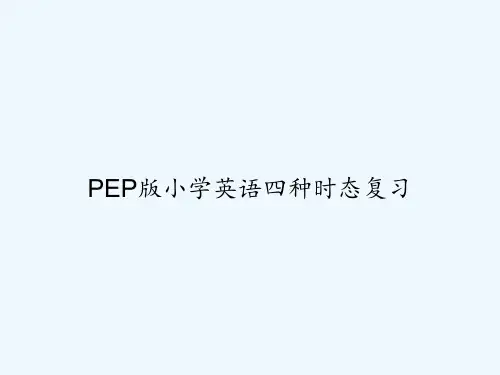
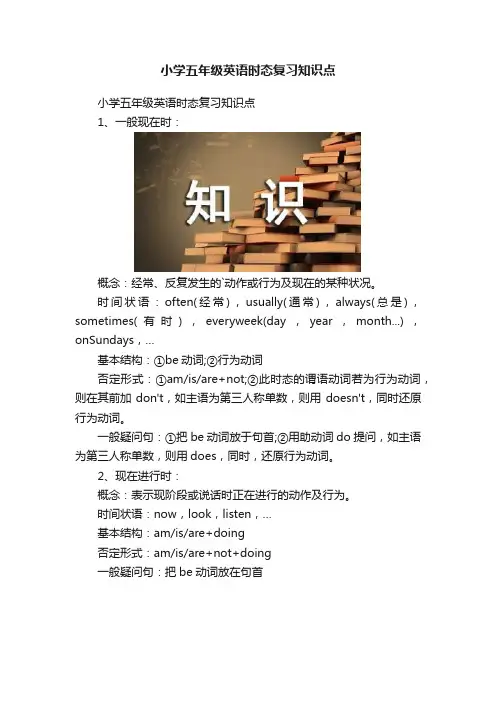
小学五年级英语时态复习知识点
小学五年级英语时态复习知识点
1、一般现在时:
概念:经常、反复发生的`动作或行为及现在的某种状况。
时间状语:often(经常),usually(通常),always(总是),sometimes(有时),everyweek(day,year,month...),onSundays,…
基本结构:①be动词;②行为动词
否定形式:①am/is/are+not;②此时态的谓语动词若为行为动词,则在其前加don't,如主语为第三人称单数,则用doesn't,同时还原行为动词。
一般疑问句:①把be动词放于句首;②用助动词do提问,如主语为第三人称单数,则用does,同时,还原行为动词。
2、现在进行时:
概念:表示现阶段或说话时正在进行的动作及行为。
时间状语:now,look,listen,…
基本结构:am/is/are+doing
否定形式:am/is/are+not+doing
一般疑问句:把be动词放在句首。
小学英语时态复习集团标准化办公室:[VV986T-J682P28-JP266L8-68PNN]
小学英语时态复习
1. 一般过去时
肯定句:动词用过去式
否定句:didn't + 动原
疑问句:Did+动原
before, ago, this morning, yesterday, last ...
过去时要注意的问题:
1.有did, didn't就没有 was, were, wasn't, weren't
2. was, were, wasn't, weren't 是表示过去的状态或场所不会出现did, did n't
I was at home yesterday.
You weren't at school yesterday.
They were strong before.
动词过去式变化:
1.直接加
2.有e加d
3.辅音y-i加ed
4.双写加ed
5.特殊变化
例题:
1. My father ____ (not stay) at home yesterday. He _____ (go) to Guan gzhou.
2. _____ they ______ (visit) the zoo last Sunday
3. ---Who _____ (teach) you maths last year
--- Mr Liu _____ (do).
4. --- When ____ you ____(take) these photos
--- I ____ (take) them last week.
5. Last Saturday my mother _____ (go) shopping and ____ (buy) me a dr ess.
6. --- When ____ your brother _____ (get) here
--- He ____ (get) here two days ago.
7. --- ____ Mike ____ (play) computer games.
--- No, he ____ . He ____ (go) to see a gilm.
8. --- When ____ you ____ (begin) to learn English
--- I ____ (begin) to learn English three years ago.
9. I didn't know you ___ here.
10. It ___ hotter yesterday than it ___ today.
11. Ben ____ a cold last week.
12. ____ _____ many beautiful flowers in our school before.
13. ____ _____ any milk in the bottle before
14. _____ ______ a heavy rain last night.
2. 现在进行时:
be(am, are, is)+ doing
肯定句:be + doing
否定句:be not + doing
疑问句:Be + 主语 + doing
listen look, now it's ...
1. 直接加ing
2. 双写加ing
3. 去e加ing
例题:
1. Listen! Who ____ (speak) English in the library
2. She _____ (like) music. Now she _____ (sing).
3. Don't _____ (run) in the street.
4. _____ you _____ (go) to school every day
5. Class is over. The pupils ______ (play) games.
6. It's 6:30. I _____(get) up.
7. Look, the pupils ____ (have) an English class.
8. My mother _____ (wash) the bowls in the kitchen now.
9. He ____ (like) art very much. He ____ (draw) a horse now.
10. Let the children go away. They ____ (make) noise here.
3. 一般将来时:
going to + do
2. will + do
肯定句:will/be going to + do
否定句:will not/be not going to + do
疑问句:Will + 主语 + do
Be + 主语 + going to do
tomorrow next... this afternoon the day after tomorrow soon
一般将来时注意的问题:
1.be going to 表示打算,不那么确定,而 will是确定的
2. will 和 be going to 不要混合起来用,不会出现will be going to, be will going to, will going to 的
3. will 没有人称变化,而 be going to 有人称变化
4. 不会出现was/were going to 的情况
例题:
1. We____ (visit) the Great Wall next month.
2. My father _____ (fly) to Beijing tomorrow.
3. You ____ (have) a seven-day holiday soon. What ___ you ____ (do)
4. Next week David ____ (visit) the new zoo in Panyu.
5. ____ you _____ (borrow) books from the library tomorrow
6. My pen is broken. I ____ (buy) a new one this Saturday.
7. They ____ (have)a picnic in the park this Sunday.
8. I ____ (write) a letter this evening.
9. He ____ (make) a kite this Saturday.
10. My mother _____ (cook) some delicious food this weekend.
4. 一般现在时:
肯定句:主语+do,
主语第三人称单数+ does
否定句:主语+don't+do
主语第三人称单数+doesn't+do
疑问句:Do+主语+do
Does+主语第三人称单数+do
usually, sometimes, often, seldom, never, every day
1.直接加s,es,
2. 某些y-i加s,es
例题:
mother ____(work) in a primary school and I ____ (study) in the same school.
____ (have) a bike and Ben ____ (have) a bike, too.
3. My sister ____ (be) a pupil. She ____ (study) very hard.
4. Who ___ (cook) breakfast for your family
5. My father is a teacher. He ____ (teach) Chinese in a primary schoo l.
6. He ____ (be) strong. He can ___ (carry) the heavy box.
7. John ____ (go) to school by bike every day.
8. Kate often ___ (play) table tennis with her friends.
9. My mother often ___ (go) shopping and ___ (buy) some vegetbales in the market.
10. --- Who ____ (study) hardest in your class。